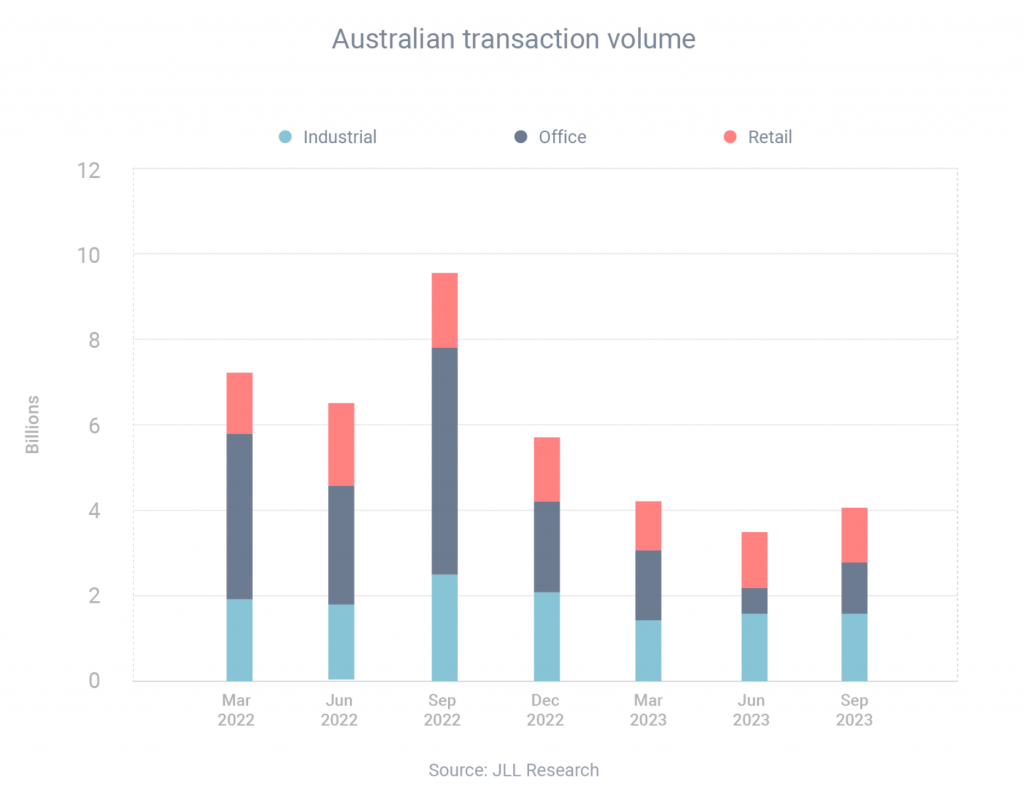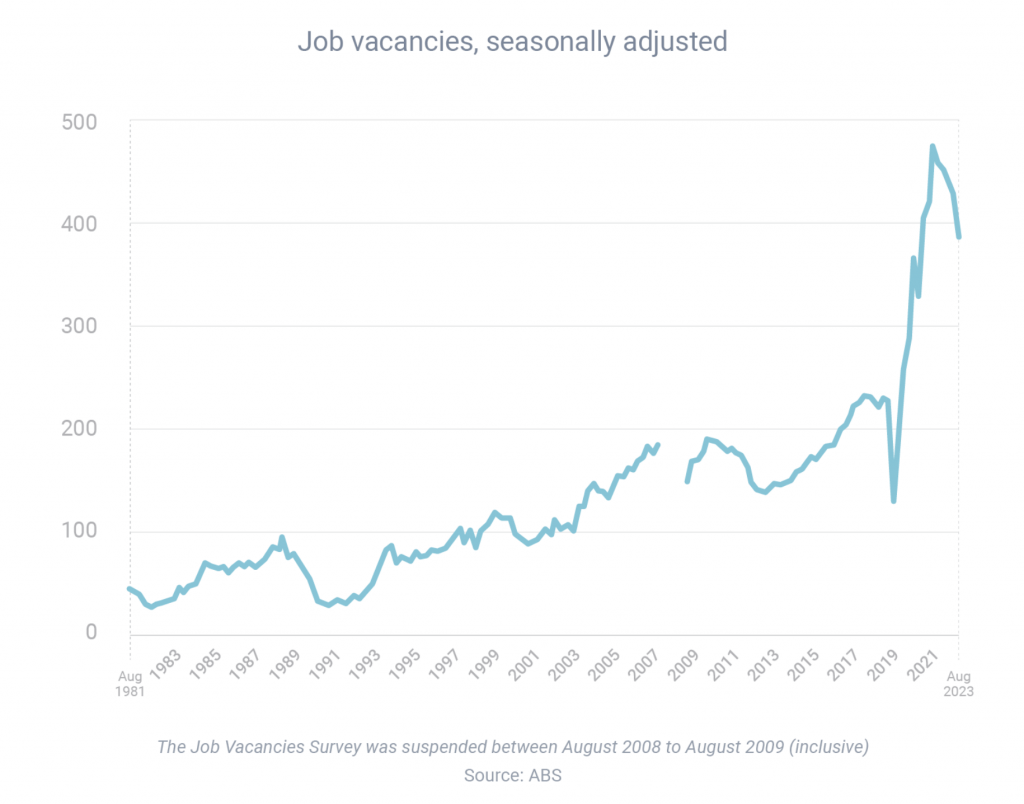Rateseeker Business News Round-up October 2023

The world of commercial real estate is poised for a resurgence, with sales set to rebound in the wake of shifting economic dynamics. In recent developments, the Australian Taxation Office (ATO) has made a decisive move, metaphorically “drawing a line in the sand,” indicating a firm stance that will undoubtedly influence property transactions.
As we witness the labour market gradually loosening its grip, the property sector finds itself at a critical juncture. This shift in employment dynamics has a direct correlation with the ebb and flow of the real estate market, impacting both commercial and residential landscapes.
Moreover, the Treasurer’s optimistic discourse on the economy adds another layer to the narrative. With a positive outlook, there’s an anticipation of increased investor confidence and heightened activity within the property market.
Commercial sales may be gearing for a rebound

Recent indicators suggest a positive trajectory in transaction activity within the Australian commercial property sector. However, a comparative analysis reveals that sales in 2023 are poised to show a notable decline from the robust figures achieved in the previous year.
According to JLL, the combined sales in the office, logistics & industrial, and retail sectors reached a substantial $29.2 billion throughout 2022. Fast forward to the first nine months of 2023, and the landscape has shifted, with sales amounting to just $11.8 billion.
This shift underscores the evolving dynamics within the commercial property market, urging investors and stakeholders to stay attuned to emerging trends and navigate the landscape strategically.

In the realm of commercial property transactions, the second to third quarter witnessed a significant increase, rising from $3.5 billion to $4.0 billion. Encouragingly, this momentum is expected to persist in the current quarter, setting the stage for a robust transaction environment.
As noted by JLL’s Australasian Head of Capital Markets, Luke Billiau, the outlook for Q4 is optimistic, with a projected uptick in sales activity. Both local and offshore investors are anticipated to re-enter the markets, fostering momentum that may extend into 2024.
However, against this backdrop of growing momentum, it’s worth noting that the total sales for the calendar year are forecasted to be lower than the figures achieved in the previous year.
This dip in transactions throughout 2023 reflects the ongoing process of pricing discovery in response to rapidly changing funding costs and a low-leverage environment relative to global markets. This period of adjustment is expected to persist, shaping the market landscape as we navigate the evolving dynamics of commercial property investments.
Looking to expand your business and need a business loan? Rateseeker can help, get in touch with one of our loan experts and let us help you turn your vision into reality.
ATO to Disclose Business Debts: A Critical Update

In a significant move, the Australian Taxation Office (ATO) has announced its intention to disclose the debts of over 9,000 businesses to credit reporting agencies come October. These are businesses that not only find themselves in arrears concerning tax or superannuation obligations but have also received a notice of intent to disclose. Importantly, they have failed to settle their debts or establish a suitable payment arrangement within the stipulated 28 days.
Assistant Commissioner Jillian Kitto emphasises that paying or engaging with the ATO is the sole recourse to prevent a business’s tax debt from becoming visible in credit rating checks. It’s a crucial reminder that businesses have the opportunity to re-engage with the ATO, but persistent disregard for tax and super obligations will result in debt disclosure.
Kitto states, “There is over $5 billion owed by businesses who currently meet the criteria for disclosure. We must draw a line in the sand to protect the Australian community and other creditors, and to ensure a level playing field for businesses who do the right thing.”
Businesses are urged to act promptly, recognising the significance of adhering to tax and super obligations to maintain financial integrity and a fair business landscape.
Labour market gradually turning to favour employers

The latest data from the Australian Bureau of Statistics reveals a consistent decline in job vacancies, marking the fifth consecutive quarter of reduction. Following a peak at a record-high 476,000 in May 2022, vacancies steadily decreased each quarter, reaching 390,400 in August 2023.
Comparing the employment landscape over this period, the dynamics have shifted. In May 2022, there were 548,100 unemployed individuals, translating to 1.15 unemployed persons for every job vacancy. Fast forward to August 2023, and the number of unemployed workers has slightly decreased to 539,700, resulting in a shift to 1.38 unemployed persons per job vacancy.
These figures underscore the evolving job market, emphasising the need for strategic workforce planning and adaptation to changing economic conditions.

While the job market retains its tightness, there’s a silver lining emerging for employers. The average employer is beginning to experience a slightly easier time retaining workers and filling job openings.
Insights from the Organisation for Economic Co-operation and Development (OECD), a prominent global intergovernmental organisation focused on economic development, suggest that the labor market is poised to continue loosening.
Forecasts indicate a shift in real GDP growth from 2.7% in 2022 to 1.8% in 2023 and further to 1.4% in 2024. Factors such as tightening financial conditions and a tempered outlook for real incomes are expected to influence this trajectory.
As the labor market pressure eases, the OECD predicts a rise in the unemployment rate to 4.6% by the end of 2024. This forecast offers valuable insights for businesses, signalling a potential shift in the employment landscape and providing an opportunity for strategic workforce planning.
Treasurer talks positively about Aussie economy

Exciting news on the economic front, the International Monetary Fund (IMF) forecasts position Australia as a standout performer in fiscal responsibility among G20 nations in 2023.
Australia’s general government budget balance, a comprehensive measure encompassing federal, state, and territory governments, is anticipated to be -1.4% for the current calendar year. Remarkably, this stands in stark contrast to the G20 advanced economies’ average of -6.1%.
Notably, Australia is expected to surpass economic heavyweights like the United States (-8.2%), Japan (-5.6%), and the United Kingdom (-4.5%). While running a deficit, Australia outpaces them in fiscal management.
The IMF recommends governments rebuild their fiscal positions to withstand future economic shocks, and that’s exactly what the Albanese government is doing.
Jim Chalmers – Treasurer
The Albanese government’s approach aims not only to address immediate challenges but also to fortify the nation’s budget and overall economic resilience.
If you’re looking to borrow to fuel your dream business goals, talk to us, we can help. Our experienced team at Rateseeker can talk you through your goals with a free no obligation chat and wealth of loan options.
Let’s work together to explore your options to fund your dreams, get in touch today.
** General Advice Warning
The information provided on this website is general in nature only and it does not take into account your personal needs or circumstances into consideration. Before acting on any advice, you should consider whether the information is appropriate to your needs and where appropriate, seek professional advice in relation to legal, financial, taxation, mortgage or other advice.




